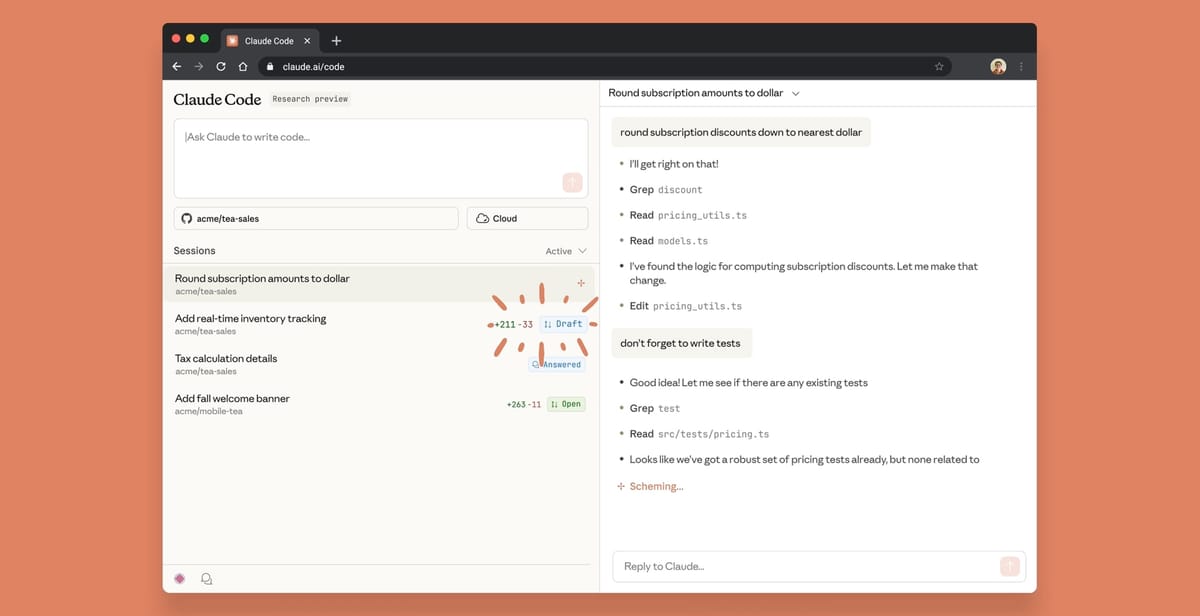
Anthropic launched the browser version Claude Code, its agentic coding tool today, removing the terminal barrier that previously limited who could actually use it.
Until now, Claude Code meant being comfortable with command-line interfaces and local setup. Now? If you can open a browser tab, you're in. The tool that's already generating over $500 million in annual run-rate revenue no longer requires you to keep your laptop open or stay chained to your desk.
Key Points:
- Browser and iOS access removes the terminal requirement that previously limited Claude Code to command-line-savvy developers
- Developers can run multiple coding tasks simultaneously on Anthropic's cloud infrastructure with real-time steering capabilities
- OpenAI's similar Codex tool launched five months earlier with nearly identical architecture
The web version connects to GitHub repositories and handles implementation in isolated sandbox environments. What's genuinely interesting is the parallel execution model—instead of babysitting one task, you can spin up multiple Claude Code instances working on different problems simultaneously. Assign the work, let them execute, check results when done.
The mobile capability matters beyond convenience. Kicking off a task from your phone while grabbing lunch, then steering it mid-execution when you notice it veering off-track—that's flexibility that changes how you work, not just where.
Anthropic's using its own product aggressively: they claim 90% of Claude Code's codebase was written using Claude Code itself. As their engineering org doubled, they report 67% productivity gains per engineer measured by daily merges. Of course, you can take those numbers with appropriate skepticism—companies tend to share their best metrics.
The competitive context is important here. OpenAI launched Codex in May 2025, five months before this announcement. It offers essentially the same capabilities: cloud-based execution, parallel tasks, works in terminal and browser. Whether Anthropic was already working on this or saw Codex and moved quickly doesn't really matter—what matters is that both leading AI labs landed on identical architectures. That suggests the approach has legs.
The broader adoption story is complicated. Google's 2025 DORA report found 90% of developers now use AI tools in their workflow, up 14% from last year. That's near-universal adoption. But Stack Overflow's developer survey shows positive sentiment fell from over 70% in 2023-2024 to just 60% in 2025.
People are using these tools more but liking them less. That gap between usage and satisfaction suggests the tools work well enough that developers can't stop using them, but not well enough that developers feel good about it. It's the kind of dynamic that usually means the technology is still early, still figuring itself out.
The competitive landscape remains crowded. GitHub Copilot dominates at 68% adoption, Cursor owns the power-user segment at $20-40 monthly, and now both OpenAI and Anthropic are pushing cloud-native agentic tools. Each promises roughly the same outcome: code faster with AI.
For now, Claude Code on the web is in research preview for Pro and Max users. The launch comes less than a week after Claude Haiku 4.5, maintaining Anthropic's aggressive shipping cadence. The gap between 90% adoption and 60% satisfaction tells you everything: developers can't stop using AI tools, but they haven't figured out how to love them yet.

